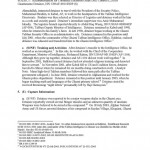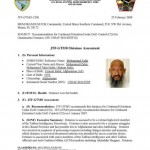
IRAN: Molten lead will be poured down throat of nuclear inspectors, IRGC commander says
The United Nations nuclear inspectors would be wrong to dare to want to look at nuclear sites in Iran and if they do so they will be arrested and molten lead would be poured down their throat, a senior commander of the Iranian regime’s Revolutionary Guards says.

IRGC Brigadier General Gholamhossein Qeybparavar, the commander of IRGC forces in the Fars province said on Saturday: “You would be wrong to dare to want to inspect our military centers and whoever does look at IRGC centers we will fill his throat with molten lead.”
Speaking to officials of the Iranian regime, members of Basij paramilitary force and high ranking clerics in the city of Eghlid in the southern province of Fars, he said: “We have not begged our nuclear knowledge from the West and Europeans to give it to them easily. We have suffered a lot and have lot our best young scientists on this path.”
Qeybparavar’s remarks come as the question of access for international inspectors has become one of the main sticking points between Tehran and six world powers as they try to overcome obstacles to a final nuclear agreement one month ahead of a deadline.
Then comes France….
ABUJA, Nigeria—French Foreign Minister Laurent Fabius said a possible nuclear deal with Iran risks sparking a nuclear arms race in the Middle East unless the agreement grants international inspectors access to Iranian military sites and other secret facilities.
In an interview with The Wall Street Journal, Mr. Fabius insisted the ability to inspect such sites be part of a final agreement with Iran to ensure Tehran doesn’t covertly try to build a nuclear weapon.
The six powers are contemplating the worst already….
Exclusive: Six powers agree way to restore U.N. sanctions in push for Iran deal – sources
Six world powers have agreed on a way to restore U.N. sanctions on Iran if the country breaks the terms of a future nuclear deal, clearing a major obstacle to an accord ahead of a June 30 deadline, Western officials told Reuters.
The new understanding on a U.N. sanctions “snapback” among the six powers – the United States, Britain, France, Germany, Russia and China – brings them closer to a possible deal with Iran, though other hurdles remain, including ensuring United Nations access to Iranian military sites.
The six powers and Iran struck an interim agreement on April 2 ahead of a possible final deal that would aim to block an Iranian path to a nuclear bomb in exchange for lifting sanctions. But the timing of sanctions relief, access and verification of compliance and a mechanism for restoring sanctions if Iran broke its commitments were among the most difficult topics left for further negotiations.
U.S. and European negotiators want any easing of U.N. sanctions to be automatically reversible if Tehran violates a deal. Russia and China traditionally reject such automatic measures as undermining their veto power as permanent members of the U.N. Security Council.
As part of the new agreement on sanctions snapback, suspected breaches by Iran would be taken up by a dispute-resolution panel, likely including the six powers and Iran, which would assess the allegations and come up with a non-binding opinion, the officials said.
The International Atomic Energy Agency (IAEA) would also continue regularly reporting on Iran’s nuclear program, which would provide the six powers and the Security Council with information on Tehran’s activities to enable them to assess compliance.
If Iran was found to be in non-compliance with the terms of the deal, then U.N. sanctions would be restored.
The officials did not say precisely how sanctions would be restored but Western powers have been adamant that it should take place without a Security Council vote, based on provisions to be included in a new U.N. Security Council resolution to be adopted after a deal is struck.
“We pretty much have a solid agreement between the six on the snapback mechanism, Russians and Chinese included,” a Western official said. “But now the Iranians need to agree.”
Another senior Western official echoed his remarks, describing the agreement as “tentative” because it would depend on Iranian acceptance.
A senior Iranian diplomat said Iran was now reviewing several options for the possible “snapback” of Security Council sanctions against Tehran.
It was unclear exactly how the snapback mechanism would function, and the officials did not discuss the precise details. It was also unclear how the proposal would protect the United States and other permanent Council members from a possible Chinese or Russian veto on sanctions restoration.
U.S. Ambassador to the United Nations Samantha Power has made it clear that Washington does not want Russia’s and China’s recent slew of vetoes on resolutions related to Syria to be repeated with an Iran nuclear agreement.
France’s Ambassador to the United States Gerard Araud said in Washington last week that, under a French idea, sanctions would be reinstated automatically in the event of non-compliance, avoiding the threat of a veto.
Under that idea, which Araud said had not to date been approved by the six powers, the onus would be on Russia or China to propose a Security Council vote not to re-impose sanctions.
Russian and Chinese officials did not respond immediately to requests for confirmation that they signed off on the snapback mechanism.
REVIEWING THE OPTIONS
U.S. Secretary of State John Kerry met with Iranian Foreign Minister Mohammad Javad Zarif in Geneva on Saturday. They discussed progress and obstacles to an agreement in the Iran nuclear talks a month before the deadline for a deal aimed at reducing the risk of another war in the Middle East.
Restoring U.S. and EU sanctions is less difficult than U.N. sanctions because there is no need for U.N. Security Council involvement.
For their part, Moscow, Beijing and Tehran have wanted assurances that Washington cannot unilaterally force a sanctions snapback – a risk they see rising if a Republican wins the U.S. presidency in 2016.
A senior Iranian diplomat confirmed that discussions of specific snapback options were underway. He told Reuters Tehran was preparing its own “snapback” in the event the Western powers fail to live up to their commitments under the agreement.
“At least three or four different suggestions have been put on the table, which are being reviewed,” he said. “Iran also can immediately resume its activities if the other parties involved do not fulfill their obligations under the deal.”
He added that it was “a very sensitive issue.”
If Iran accepts the proposed snapback mechanism, there are other hurdles that must be overcome, including IAEA access to Iranian military sites and nuclear scientists and the pace of sanctions relief.
Iran says its nuclear program is entirely peaceful and rejects allegations from Western countries and their allies that it wants the capability to produce atomic weapons. It says all sanctions are illegal and works hard to circumvent them.


